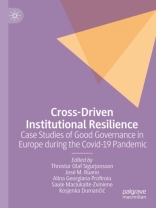This book presents a series of studies on organizations across Europe, displaying new perspectives on institutional resilience of affected governance structures during crisis. Such an approach to governance studies not only aims to provide readers with conceptual and practical knowledge on crisis experience of organizations, but also to equip them with necessary cognitive tools to perform well in a similar crisis context in the future. The book highlights knowledge on institutional resilience and delivers an enduring resource for researchers and students on a time of unprecedented crisis. Cross-national/sectorial interdependences in Europe are multiplying, while institutional reaction and international collaboration mechanisms are falling behind. The studies presented here aim to shape a conceptual understanding of students, academics, and practitioners considering these contemporary challenges and opportunities. They provide a valuable resource in the field of governance, sustainability, crisis management, innovation, and leadership.
Jadual kandungan
Chapter 1: Resilience and partnership building in health and long-term care services. The
case of the health and social consortium of Catalonia.- Chapter 2: Resilience of the Romanian Healthcare System under COVID-19 Pandemic.- Chapter 3: Klappir Green Solutions: maintaining a focus on sustainability throughout the pandemic.- Chapter 4: The role of cultural and social dimensions on new entrepreneurship opportunities after the pandemic: comparative analysis between deep-tech entrepreneurs in Malta and Lithuania.- Chapter 5: How Iceland tech firms Controlant and Sidekick saw opportunity in the Covid-19 pandemic.- Chapter 6: How business model innovation can support resilience and fast recovery: lessons learned from the pandemic.- Chapter 7: Building resilience in high education – the case study of FEB.- Chapter 8: The Impact of the COVID-19 Pandemic on the Romanian Education System.- Chapter 9: Policy responsiveness to building resilience in education: opportunities for innovators.- Chapter 10: The University of Iceland: shifting learning and research in time of Covid-19.- Chapter 11: Local Government Responses to COVID-19 Crisis in Romania.- Chapter 12: The National Theatre of Iceland: culture in survival mode in time of crisis.
Mengenai Pengarang
Throstur Olaf Sigurjonsson is a Professor at the University of Iceland, as well as a member of faculty at Copenhagen Business School, Denmark. His areas of research are corporate governance, business ethics, policymaking, and policy implementation.
José M. Ruano is a Professor at the Complutense University of Madrid (UCM), Spain. His main research fields are public policy analysis, local governance, comparative public administration and reform of the State.
Alina Georgiana Profiroiu is a Professor at the Bucharest University of Economic Studies, Romania, Department of Administration and Public Management. Her research is on local public administration, civil service and public administration reform, institutional and regional resilience and governance.
Saule Maciukaite-Zviniene is Professor of Innovation and Knowledge Transfer at Vilnius University Business School, Lithuania, and Head of Entrepreneurship and Innovation Development. She is the Chair of the National Council of Education and co-chair of the CERN-Lithuania Committee.
Kosjenka Dumančić is an Associate Professor at Faculty of Economics and Business at the University of Zagreb, Croatia. Her research interests are company and commercial law, European law and corporate governance.












